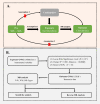Causal associations between human gut microbiota and cholelithiasis: a mendelian randomization study
- PMID: 37305422
- PMCID: PMC10248444
- DOI: 10.3389/fcimb.2023.1169119
Causal associations between human gut microbiota and cholelithiasis: a mendelian randomization study
Abstract
Background: There was some evidence that gut microbiota was closely related to cholelithiasis, but the causal relationship between them remained unclear. In this study, we try to use Two-sample Mendelian randomization (MR) to clarify the potential causal relationship between gut microbiota and cholelithiasis.
Methods: Summary Genome-Wide Association Studies (GWAS) statistical data for gut microbiota was obtained from MiBioGen, and the data of cholelithiasis was obtained from UK Biobank (UKB). Two-sample MR analyses were performed to assess causalities between gut microbiota and cholelithiasis mainly using the inverse-variance weighted (IVW) method. Sensitivity analyses were used to determine the robustness of the MR results. Reverse MR analyses were performed to examine the reverse causal association.
Results: Our research results, based primarily on the IVW method, support the existence of a causal relationship between nine gut microbial taxa and cholelithiasis. We observed a positive association between Genus Butyrivibrio (p=0.032), Genus Lachnospiraceae_UCG_001 (p=0.015), Genus Ruminococcaceae_NK4A214_group (p=0.003), Genus Ruminococcaceae_UCG_011 (p=0.010) and cholelithiasis, while Order Rhodospirillales (p=0.031), Genus Actinomyces (p=0.010), Genus Phascolarctobacterium (p=0.036), Genus Rikenellaceae_RC9_gutgroup (p=0.023), Genus Ruminococcaceae_UCG_013 (p=0.022) may be associated with a reduced risk of cholelithiasis. We did not find a reverse causal relationship between cholelithiasis and 9 specific gut microbial taxa.
Conclusions: This is the first mendelian randomization study to explore the causalities between specific gut microbiota taxa and cholelithiasis, which may provide new ideas and a theoretical basis for the prevention and treatment of cholelithiasis in the future.
Keywords: gut microbiota; causality; cholelithiasis; genetic association; mendelian randomization.
Copyright © 2023 Li, Ren, Qin, Zhao, Peng, Ma and Luo.
Conflict of interest statement
The authors declare that the research was conducted in the absence of any commercial or financial relationships that could be construed as a potential conflict of interest.
Figures


Similar articles
-
Association between gut microbiota and NAFLD/NASH: a bidirectional two-sample Mendelian randomization study.Front Cell Infect Microbiol. 2023 Dec 1;13:1294826. doi: 10.3389/fcimb.2023.1294826. eCollection 2023. Front Cell Infect Microbiol. 2023. PMID: 38106475 Free PMC article.
-
Genetic support of the causal association between gut microbiota and peripheral artery disease: a bidirectional Mendelian randomization study.Aging (Albany NY). 2024 Jan 9;16(1):762-778. doi: 10.18632/aging.205417. Epub 2024 Jan 9. Aging (Albany NY). 2024. PMID: 38198148 Free PMC article.
-
Causal associations between human gut microbiota and hemorrhoidal disease: A two-sample Mendelian randomization study.Medicine (Baltimore). 2024 Mar 29;103(13):e37599. doi: 10.1097/MD.0000000000037599. Medicine (Baltimore). 2024. PMID: 38552035 Free PMC article.
-
Genetic liability of gut microbiota for idiopathic pulmonary fibrosis and lung function: a two-sample Mendelian randomization study.Front Cell Infect Microbiol. 2024 May 22;14:1348685. doi: 10.3389/fcimb.2024.1348685. eCollection 2024. Front Cell Infect Microbiol. 2024. PMID: 38841114 Free PMC article.
-
Causal relationship between gut microbiota and polycystic ovary syndrome: a literature review and Mendelian randomization study.Front Endocrinol (Lausanne). 2024 Feb 1;15:1280983. doi: 10.3389/fendo.2024.1280983. eCollection 2024. Front Endocrinol (Lausanne). 2024. PMID: 38362275 Free PMC article. Review.
Cited by
-
The management of a duodenal fistula involving the right hepatic duct: a rare case report.Front Med (Lausanne). 2024 Feb 1;11:1346590. doi: 10.3389/fmed.2024.1346590. eCollection 2024. Front Med (Lausanne). 2024. PMID: 38362537 Free PMC article.
-
The causal relationship between gut microbiota and biliary tract cancer: comprehensive bidirectional Mendelian randomization analysis.Front Cell Infect Microbiol. 2024 Mar 15;14:1308742. doi: 10.3389/fcimb.2024.1308742. eCollection 2024. Front Cell Infect Microbiol. 2024. PMID: 38558852 Free PMC article.
-
Causal links between gut microbiomes, cytokines and risk of different subtypes of epilepsy: a Mendelian randomization study.Front Neurosci. 2024 May 24;18:1397430. doi: 10.3389/fnins.2024.1397430. eCollection 2024. Front Neurosci. 2024. PMID: 38855442 Free PMC article.
-
Causal associations between human gut microbiota and osteomyelitis: a Mendelian randomization study.Front Cell Infect Microbiol. 2024 Apr 9;14:1338989. doi: 10.3389/fcimb.2024.1338989. eCollection 2024. Front Cell Infect Microbiol. 2024. PMID: 38655282 Free PMC article.
-
Advances in research on the role of gut microbiota in the pathogenesis and precision management of gallstone disease.Front Med (Lausanne). 2025 Jun 25;12:1535355. doi: 10.3389/fmed.2025.1535355. eCollection 2025. Front Med (Lausanne). 2025. PMID: 40636353 Free PMC article. Review.
References
Publication types
MeSH terms
LinkOut - more resources
Full Text Sources
Medical

